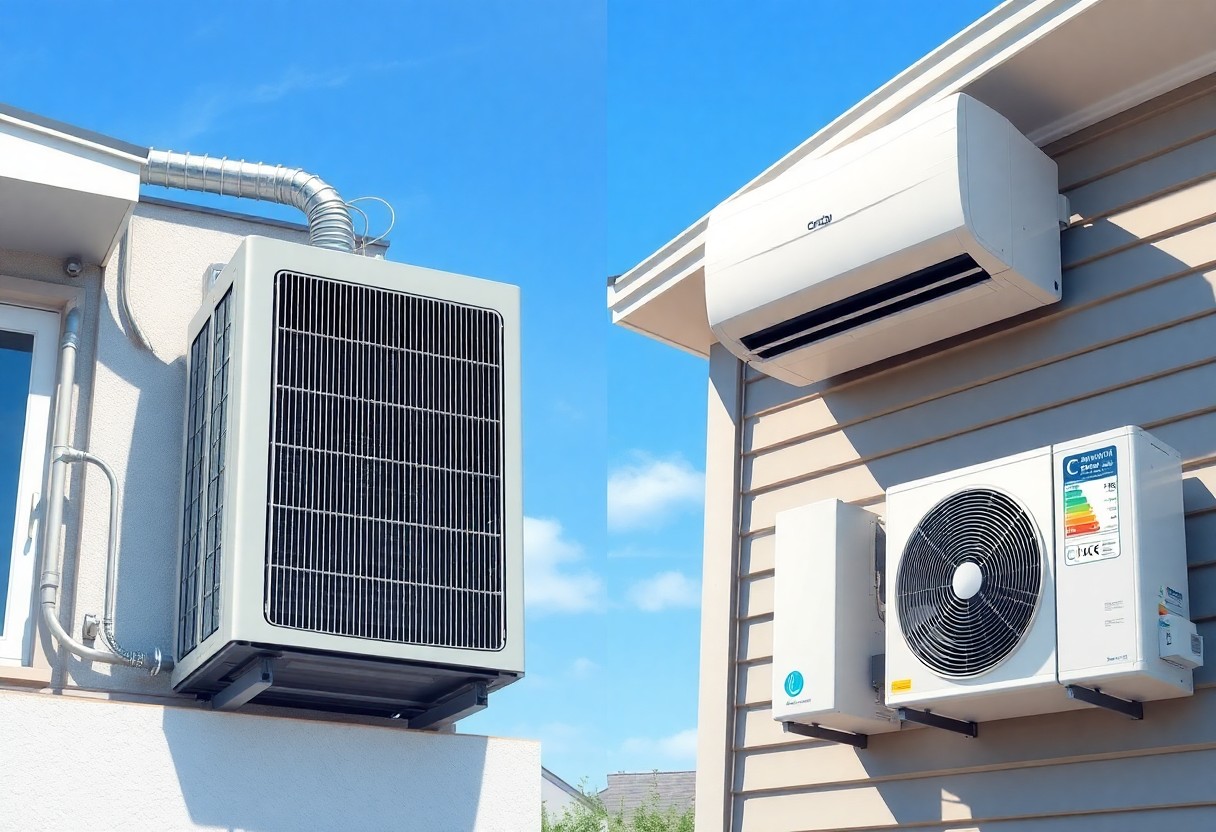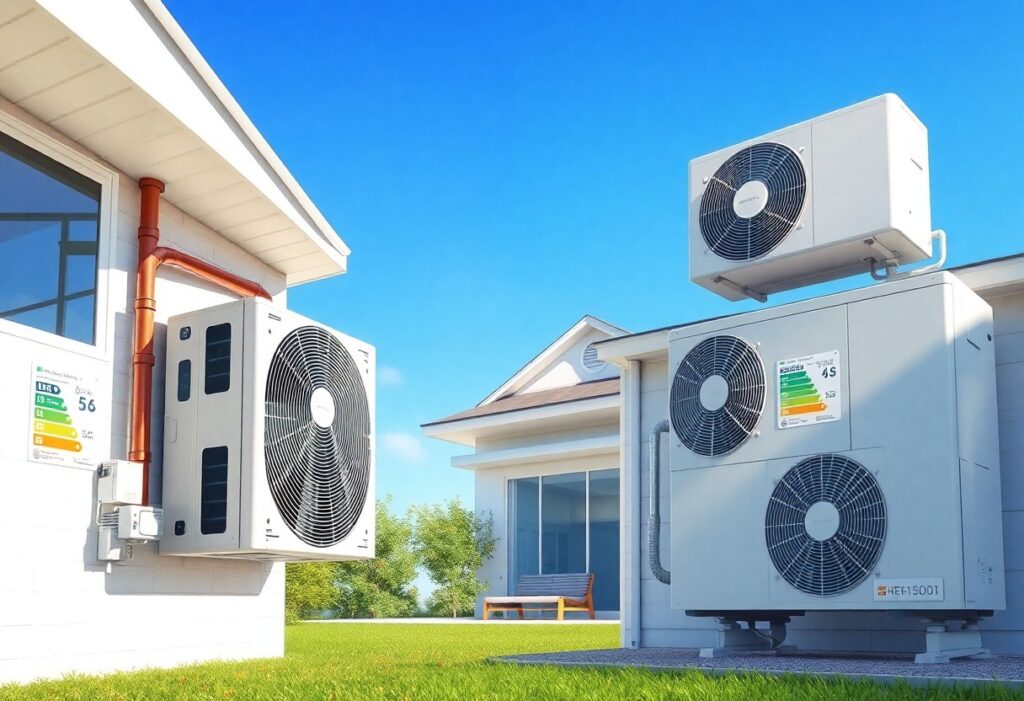Air quality and comfort in your home significantly depend on your choice of heating and cooling systems. When deciding between a heat pump and a central air conditioner, understanding their differences in energy efficiency, costs, and performance is crucial. By evaluating your specific needs and regional climate, you can determine which system best suits your lifestyle, leading to greater comfort and reduced energy bills.

Understanding Heat Pumps
Your HVAC options are diverse, but heat pumps stand out as versatile systems providing both heating and cooling solutions. These systems not only help maintain temperatures in your home throughout the year but also offer energy-efficient performance, making them a popular choice for environmentally-conscious homeowners.
How Heat Pumps Work
On a fundamental level, heat pumps operate by transferring heat instead of generating it. In winter, they extract warmth from the air or ground outside and bring it into your home, while in summer, they reverse the process, expelling indoor heat. This mechanism leads to lower energy consumption and fosters a comfortable indoor climate.
Types of Heat Pumps
With various types of heat pumps available, understanding your options can help you choose the best fit for your home. The most common types include:
| Type | Description |
| Air-Source Heat Pumps | Use outside air to heat or cool your home. |
| Ground-Source Heat Pumps | Utilize the earth’s stable temperature for efficiency. |
| Hybrid Heat Pumps | Combine heat pump technology with a traditional furnace. |
| Ductless Mini-Split Heat Pumps | Offer flexibility without the need for ductwork. |
| Absorption Heat Pumps | Use a heat source, like natural gas, for operation. |
- Assume that selecting the right type can maximize comfort and efficiency in your home.
Assessing heat pump types further reveals variations in efficiency and installation needs. For example, air-source heat pumps work best in moderate climates, while ground-source models excel in terms of energy efficiency and sustainability.
| Type | Advantages |
| Air-Source | Cost-effective and easy to install. |
| Ground-Source | High efficiency and lower operating costs. |
| Hybrid | Optimizes energy use based on temperature. |
| Ductless | Flexible installation and room-specific heating/cooling. |
| Absorption | Can run on renewable energy sources. |
- Assume that understanding these differences can guide you towards an efficient heating and cooling solution for your specific needs.
Understanding Central Air Conditioners
It’s important for you to understand how central air conditioners operate as they are a common cooling solution in many homes. These systems solely focus on cooling your indoor environment, unlike heat pumps, which can also provide heating. For a detailed comparison, you can check out Heat Pumps vs Air Conditioning for insights that may help you make an informed decision.
How Central AC Systems Work
Against popular belief, central air conditioners do more than just cool your home; they regulate humidity, enhance comfort, and improve indoor air quality by cycling air through a system of ducts. This makes them effective in maintaining a temperature that’s consistently cooler than the outdoor heat.
Key Components of Central AC
Below the surface, central AC systems consist of several vital components that work in harmony, including an indoor evaporator coil, an outdoor condenser unit, a compressor, and a system of ducts for air distribution. Understanding these components can help you appreciate the functionality that each brings to the system.
Systems integrate these components to efficiently cool your home. The compressor compresses refrigerant, which carries heat away from your indoors, while the evaporator coil absorbs heat from the air. The cooled air is then circulated through ducts, ensuring every corner of your space enjoys a comfortable temperature during hot months.
Energy Efficiency Comparisons
Some homeowners prioritize energy efficiency when choosing between heat pumps and central air conditioning units. Understanding how each system operates can help you make an informed decision tailored to your home’s specific needs. Your choice will impact both energy consumption and utility costs, especially when considering factors like regional climate and insulation quality.
Efficiency Factors
| System | Efficiency Rating |
|---|---|
| Heat Pumps | Higher; typically lower energy consumption |
| Central Air Conditioners | Lower; uses more energy with separate heating system |
Efficiency of Heat Pumps
Behind their popularity, heat pumps leverage the transfer of heat rather than generating it, making them generally more energy-efficient, particularly in moderate climates. This efficiency translates to reduced utility bills, as heat pumps consume less energy to heat or cool your home compared to traditional systems.
Efficiency of Central AC Units
Above all, central air conditioning units are designed primarily for cooling, which limits their efficiency in heating scenarios. While they effectively maintain lower indoor temperatures during hot months, they do require an additional heating system for colder seasons, resulting in higher overall energy consumption.
Pumps can cool your home by extracting indoor heat, but central AC systems do not balance this by providing heating. This means you’ll need to factor in additional costs for heating solutions in winter, which can make your energy bills higher than with a heat pump, particularly during extreme weather conditions.

Cost Analysis
Many homeowners find that the cost of your HVAC system plays a significant role in decision-making. While heat pumps typically have a higher initial investment, their dual functionalities can provide savings throughout the year. For a detailed comparison, check out Heat Pump Vs. AC: Which Is Best for Your Home? to see if a heat pump aligns with your budget and energy goals.
Initial Installation Costs
Below the upfront costs of installing a heat pump exceed those of a central air conditioner due to their advanced technology that accommodates both heating and cooling. While air conditioners are less expensive to install, you must budget for an additional heating solution in colder months.
Long-Term Operating Costs
Among the factors influencing your long-term expenses, energy efficiency is paramount. Heat pumps generally save you more on utility bills compared to central air systems, especially in moderate climates. However, their efficiency can decrease dramatically during extreme temperature fluctuations, which may affect overall running costs.
Installation of a heat pump can lead to significant savings over time due to its energy-efficient operation. By transferring heat instead of generating it, heat pumps consume less energy, making them a cost-effective option for those looking to lower energy bills. In contrast, central air conditioners may lead to higher operating costs in the long run due to their reliance on traditional cooling mechanisms, particularly if you’re also maintaining a separate heating system.
Performance in Different Climates
Now, understanding how heat pumps and central air conditioners perform in various climates can help you make informed choices for your home. Heat pumps excel in moderate climates, offering efficient heating and cooling with lower energy consumption. In contrast, central air conditioners are specifically designed to combat extreme temperatures, making them a popular choice in regions with significant seasonal variations. Evaluating your local climate and your home’s needs will guide you to the most effective system.
Heat Pumps in Moderate Climates
The efficiency of heat pumps shines in moderate climates, where the temperature differential between indoors and outdoors is less extreme. By transferring heat rather than generating it, heat pumps consume less energy, ultimately reducing your utility bills. This makes them an ideal solution for homes in regions with mild winters and warm summers, as they provide reliable heating and cooling without the high energy costs usually associated with traditional systems.
Central AC in Extreme Weather
For homeowners in areas with severe weather conditions, central air conditioning systems are often more reliable than heat pumps. These systems are specifically designed to handle sweltering summers, effectively maintaining indoor temperatures, often up to 20 degrees cooler than the scorching heat outside. In winter, you may need a separate heating system, but central AC units remain efficient during heat waves, making them necessary for comfortable living in extreme climates.
Central air conditioning units are particularly valuable when temperatures soar, as they excel in maintaining consistent indoor climates regardless of the outdoor conditions. They cool down spaces effectively, providing relief during blistering summer days. On average, a well-maintained central AC system can reduce humidity and keep indoor air quality high, making it a smart choice for homeowners prioritizing comfort during harsh weather events. However, consider supplementing these systems with efficient heating options to ensure warmth throughout winter months.
Indoor Air Quality and Comfort
To ensure a comfortable living environment, it’s important to consider how different HVAC systems impact indoor air quality. Both heat pumps and central air conditioning units can effectively manage humidity and indoor comfort, but the way they operate can fluctuate based on your home’s specific needs and local climate conditions. Evaluating these systems can enhance your home’s air quality, making it a healthier space for you and your family.
Heat Pumps and Air Quality
On average, heat pumps utilize renewable heat sources from the air or ground, which can lead to improved indoor air quality. When properly maintained, they can effectively filter allergens and air pollutants from your home. Additionally, their heating and cooling capabilities in one system can eliminate the need for multiple units, simplifying air quality management and enhancing energy efficiency.
Central AC Systems and Humidity Control
One key advantage of central air conditioning systems is their ability to efficiently manage indoor humidity levels. This is particularly important in regions with high humidity, where maintaining comfortable indoor air conditions can be a challenge. Central AC units effectively dehumidify the air while cooling your living space, ensuring that excess moisture does not lead to discomfort or potential mold growth.
Due to their design, central AC systems actively draw in indoor air, dehumidifying it before circulating the cooled air back into your home. This process not only keeps your spaces at comfortable temperatures but also reduces humidity levels, which can help prevent a range of indoor air quality issues. For households in humid climates, this can significantly enhance overall comfort and health. As a result, weighing the benefits of humidity control in your decision is vital for your living environment.
Final Words
Upon reflecting on heat pumps versus central air conditioning, it’s important to assess your specific needs and circumstances. If you’re in a moderate climate and looking for an energy-efficient solution that provides both heating and cooling, a heat pump may be your best bet. Conversely, if you experience extreme seasonal variations, a central air system paired with a separate heating option could be more suitable. Ultimately, evaluating your home’s characteristics and energy efficiency goals will help you make the most informed decision for your comfort and budget.
